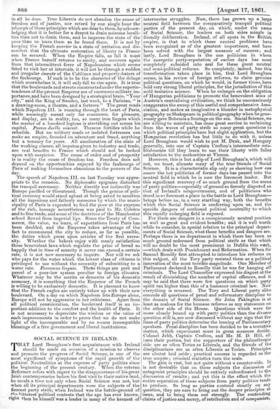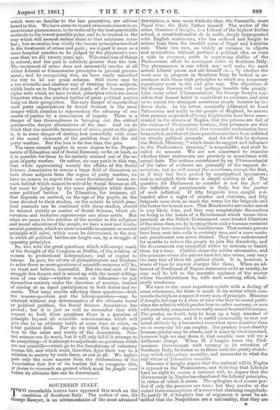SOCIAL SCIENCE IN IRELAND. T HAT Lord Brougham's first acquaintance with
Ireland should be made on occasion of a mission to observe and promote the progress of Social Science, is one of the most significant of symptoms of the rapid growth of the political Neutralities at the expense of party politics since the beginning of the present century. When the veteran Reformer refers with regret to the disappearance of his great Irish contemporaries before his first visit to their native land, be meals a time not only when Social Science was not, but when all its principal departments were the subjects of the' fiercest party strife, when Ireland was the battle-ground of 14 Bitterest political contests that the age has ever known, right then he himself was a leader in many of the keenest of I internecine struggles. Now, there has grown up a large neutral field between the comparatively tranquil political parties of the present day, on which, under the name of Social Science, the leaders on both sides mingle is friendly deliberation. Ireland, of all spots in the British empire, is that in which these neutral problems have been recognized as of the greatest importance, and have been solved with the largest measure of success ; and lastly, Lord Brougham is the one politician in whom the energetic party-reputation of earlier days has most completely subsided into zeal for these great neutral and semi-political reforms. So completely, indeed, has this transformation taken place in him, that Lord Brougham seems, in his review of foreign reforms, to claim genuine political questions, on which he would, in former times, have held very strong liberal principles, for the jurisdiction of this mild tentative science. When be enlarges on the obligation of Hungarian politicians to promote the benevolent aims of Austria's centralizing civilization, we think he unconsciously exaggerates the sweep of this useful and comprehensive Asso- ciation, and makes as imaginative a blunder in metaphysical geography as Shakspeare in political geography when he gene- rously gave Bohemia a frontage on the sea. Social Science, we are willing to maintain, has done great service in reclaiming from the waves of party strife so many great questions to which political principles have but slight application, but the Hungarian revolution has but little to do with it, unless Lord Brougham would wish to put M. Deak, and Hungary generally, into one of Captain Crofton's intermediate esta- blishments till they learn to use their liberty with fuller satisfaction to the authorities at Vienna.
However, this is but a slip of Lord Brougham's, which will not, we trust, alienate many of the true friends of Social Science. It is a characteristic slip only as showing how con amore the hot politician of former days has passed into the neutral field in which he is now the foremost leader. But this significant recovery of so much ground from the arena of party politics—especially of ground so fiercely disputed as that of Ireland's misgovernment, and of politicians who stood in so foremost a place in the battle as Lord Brougham— brings before us, in a very startling way, both the benefits which this Social Science is conferring upon us, and the specific dangers of confessed political neutrality to which this rapidly enlarging field is exposed. For there are dangers in a conspicuously neutral position as well as great and evident benefits ; and it is well worth while to consider, in special relation to the principal depart- ments of Social Science, what those benefits and dangers are. Perhaps there is no department in which there has been so much ground redeemed from political strife as that which will no doubt be the most prominent in Dublin this week, —which deals with Punishment and Reformation. When Sir Samuel Romilly first attempted to introduce his reforms on this subject, all the Tory party resisted them as a political innovation of the most terrible magnitude. One Member of Parliament declared to Romilly that he was for hanging all criminals. 'The Lord Chancellor expressed his disgust at the result of diminishing the number of capital offences, and it may be said that there were few questions on which party spirit ran higher than this of a humaner criminal law. Now everything is reversed. The Tory and Liberal party alike concede all questions of penal and reformatory discipline to the domain of Social Science. Sir John Pakington is at least as zealous for the humane reforms as any statesman on the other side of the House. Questions which were far more closely bound up with party politics than the divorce question still is, are now discussed without any sign that the lines of party politics determine the leaning of Parliamentary speakers. Penal discipline has been decided to be a tentative matter, which experiment must in great measure decide. Colonel Jebb, Captain Crofton, and Mr. M. D. Hill, all have their parties, but the supporters of the philanthropic side are as often Tories as Liberals, and the friends of the disciplinarians are as often Liberals as Tories. Principles are almost laid aside ; practical success is regarded as the true umpire ; criminal statistics turn the scale. The gain is vast, but not quite without a counter-side. It is not desirable that on these subjects the discussion of antagonist principles should be entirely subordinated to the discussion of results ; and yet this is the effect which the entire separation of these subjects from party politics tends to produce. So long as parties contend stoutly on any question, they are sure to bring out the deer principles at issue, and to bring them out strongly. The contending claims of justice and mercy, of retribution and of compassion, which were so familiar to the last generation, are seldom heard in this. We have come to regard criminals almost as an unwelcome phenomenon, to be reduced by the best practicable methods to the lowest possible point, and to be treated in the way which will soonest reduce than to that minimum num- ber ; but we realize less vividly the human principles involved in the treatment of crime and guilt ; we regard it more as a mere hospital practice to be judged by the physician's suc- cess than we did twenty years ago. This condition of things is natural, and the gain is infinitely greater than the loss. The treatment of crime does not necessarily involve at all either Liberal or Conservative principles in general govern- ment ; and by recognizing this, we have vastly smoothed the way to all our great reforms. Still there may be a too scientific and abstract way of treating these subjects, which leads us to forget the real depth of the human prin- ciples with which we have to deal, principles which are never forgotten when the pitched battles of great political parties hang on their tecognition. The only danger of superseding such party organizations by Social Science is the same danger which attaches to superseding the advocacy of our courts of justice by a commission of inquiry. There is a danger of less thoroughness in bringing out the critical points—the deeper alternatives of the case. And we do think that the scientific treatment of crime, great as the gain is, is in some danger of dealing less powerfully with some of the moral elements of the problem than did the old party warfare. But the loss is far less than the gain.
The same remark applies in some degree to the Depart- ments of Education and of Social Economy, so far, at least, as it is possible for them to be entirely rescued out of the re- gion of party warfare. Or rather, we may put it in this way, that while appreciating warmly the efforts of the Social Science Association to rescue a large field of discussion on both these subjects from the region of party warfare, we have no reason to regret that some fundamental issues re- main behind which cannot be solved by Social Science at all, but must be judged by the same principles which deter- mine political battles. In Education, for instance, all that depends on method, on the age of the pupils, on the time devoted to their studies, on the extent to which prac- tical pursuits can be combined with these studies, should be treated strictly as matter of Social Science, which ob- servation and tentative experiments can alone settle. But when we come to the relation of the secular to the religions and moral education of the people, we have a new and funda- mental question, which no mere scientific treatment or mental principle will solve, which must be determined, in the way in which all political battles are fought out, by a struggle of opposing principles.
So, too, with the great questions which will occupy much of the thought of the Congress at Dublin, of the relation of women to professional independence, and of capital to labour. In part, the efforts of philanthropists and thinkers to solve these as mere questions of scientific economy will be, we trust and believe, successful. But the real root of the struggle lies deeper, and is mixed up with the moral willing- ness of one class—whether women or labourers—to put themselves entirely under the direction of another, instead of aiming at an equal participation in both duties and re- wards. That large results affecting these questions—both the woman-question and the labour-question—may be attained without any determination of the ultimate moral or political problem, the Social Science Association has proved ; but it is just as well to remember that with respect to both these questions there is a question of principle beyond all scientific considerations which will give rise to an ultimate battle at some time or other, on a fair political field. Nor do we think this any deroga- tion to the value and merits of the A.ssociation. Neu- tral science can do much, but it will only fail if it attempt to do everything it attempt to adjudicate on questions which are not scientific—which go to the foundations of voluntary human life, and which must, therefore, fight their way to a solution in society by main force, or not at all. We antici- pate only the more success from the deliberations of the Association that few of its leaders fail to recognize this, or desire to encroach on ground which must be fought over before its ultimate fate can be determined.































 Previous page
Previous page